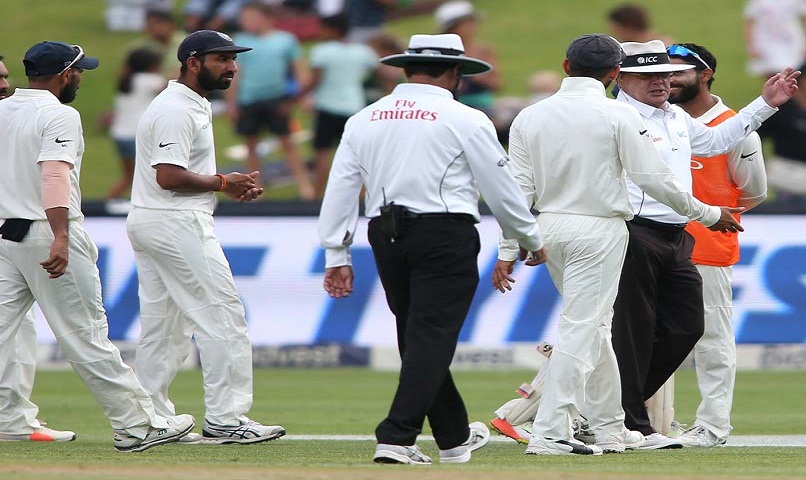South Africa-India test stopped because of dangerous pitch

Match officials stopped play in the third cricket test between South Africa and India on Friday because of a dangerous pitch, an extremely rare decision taken after South African batsman Dean Elgar was hit in the grill of the helmet by a bouncer from fast bowler Jasprit Bumrah and needed a concussion test.
The move by match officials to take players off because of concerns over their safety was only the third time in the history of test cricket that a game has been stopped in this way.
The game wasn't completely called off, though. After meetings involving match officials and team captains Faf du Plessis and Virat Kohli, it was decided the test would continue on Saturday, the International Cricket Council said.
"The on-field umpires, in consultation with the match referee, and after speaking with both the captains and groundsmen, have decided that the Johannesburg Test will resume on time on Saturday," the ICC said in a statement.
Cricket's ruling bodysaid on-field umpires Ian Gould and Aleem Dar had called players off because they wanted to consult with match referee Andy Pycroft "regarding the condition of the pitch." The umpires would continue to monitor the pitch, the ICC said.
Elgar was the latest in a series of batsmen from both teams to be hit by the ball on a fast, bouncy and unpredictable surface at the Wanderers.
He was the first to be hit on the head, though, with others getting struck on the fingers, and in the ribs and midriff.
"I think that if it's hitting the rib cage or the fingers, I think you can maybe get away with it," South Africa team manager Mohammed Moosajee said. "But if it's hitting a batsman in the face..."
There had been signs throughout the day that the umpires were worried over the surface, and both team managers were called into Pycroft's office at the tea break to be told the officials were considering ruling the pitch dangerous.
The blow to Elgar's helmet, which came after he had been also hit on the hand and on the hip, was the final straw.
The decision to stop play infuriated India, which had a 223-run lead and was in control of a game they desperately want to win after already losing the series and facing an embarrassing 3-0 whitewash.
India manager Sunil Subramanian and batsman Ajinkya Rahane both said that India's players did not want to go off.
"When you are batting with a new ball it is difficult, but you can't call it dangerous," Rahane said. "I hope he's fine," Rahane said of Elgar, "(but) I don't think the wicket is too dangerous."
The situations are different, but there will be memories of Australia batsman Phil Hughes, who died after being hit in the neck by the ball in a game in 2014. While there was nothing wrong with that pitch, it underlined the severe dangers of being struck by a hard leather ball being bowled at speeds sometimes in excess of 140 kph (87 mph).
At the Wanderers, Gould and Dar came together to speak on a number of occasions during the day's play, but it took the blow to Elgar's head to force them to act.
There had been warnings.
Former West Indies fast bowler Michael Holding, a cricket great and working as a TV commentator at the Wanderers, said earlier in the day - when India batsman Murali Vijay was hit a number of times - that the game should be stopped.
"This is not a cricket pitch, this is dangerous. Call it off, forget it," Holding told the cricinfo.com website. "You can't play cricket on that."
The incident completely overshadowed the test, and the series, between the two top-ranked teams in the world.
Top-ranked India batted through most of the day on the pitch and fought its way to a position of dominance, thanks to a determined 48 from Rahane and 41 from Kohli.
South Africa was 17-1 and struggling when Elgar was hit.
As he received treatment, the umpires came together and match referee Pycroft emerged from his office and onto the playing field to talk with them. The players were then directed to leave the field, but India's team was clearly reluctant.
"We have not prepared this wicket. It's a South African wicket. We have come and played here," Subramanian said, putting the blame squarely on the home team and ground staff. "We're willing to play."
The rights and wrongs of taking the players off for dangerous conditions are complex in asportwhere batsmen are regularly hit in the hands, arms, ribs, and even helmet by the ball. It's considered part of the game.
The Wanderers in Johannesburg has a reputation for being a fast, bouncy wicket that's difficult for batsmen. But the problem is that this particular pitch has also been littered with cracks, which makes the bounce and direction of the ball unpredictable and far more difficult for batsmen to read. When you combine cracks with a fast wicket, it can become dangerous.
Elgar was hit by what appeared to be a regular bouncer from Bumrah, another complaint from India. But there was an argument that the condition of the pitch had shaken him up and contributed to him being hit.
"Player safety is, in my opinion, paramount," South Africa coach Ottis Gibson said. Gibson said that South Africa captain du Plessis had already expressed concerns over the pitch when India was batting.
A test between West Indies and England was called off in Antigua in 2009, but that was because of an outfield that was unfit and might have endangered fielders.
A test between the same two teams was abandoned because of a dangerous batting pitch in Jamaica in 1998, the only other time a test match has been stopped because of danger to the batsmen, reports AP.
